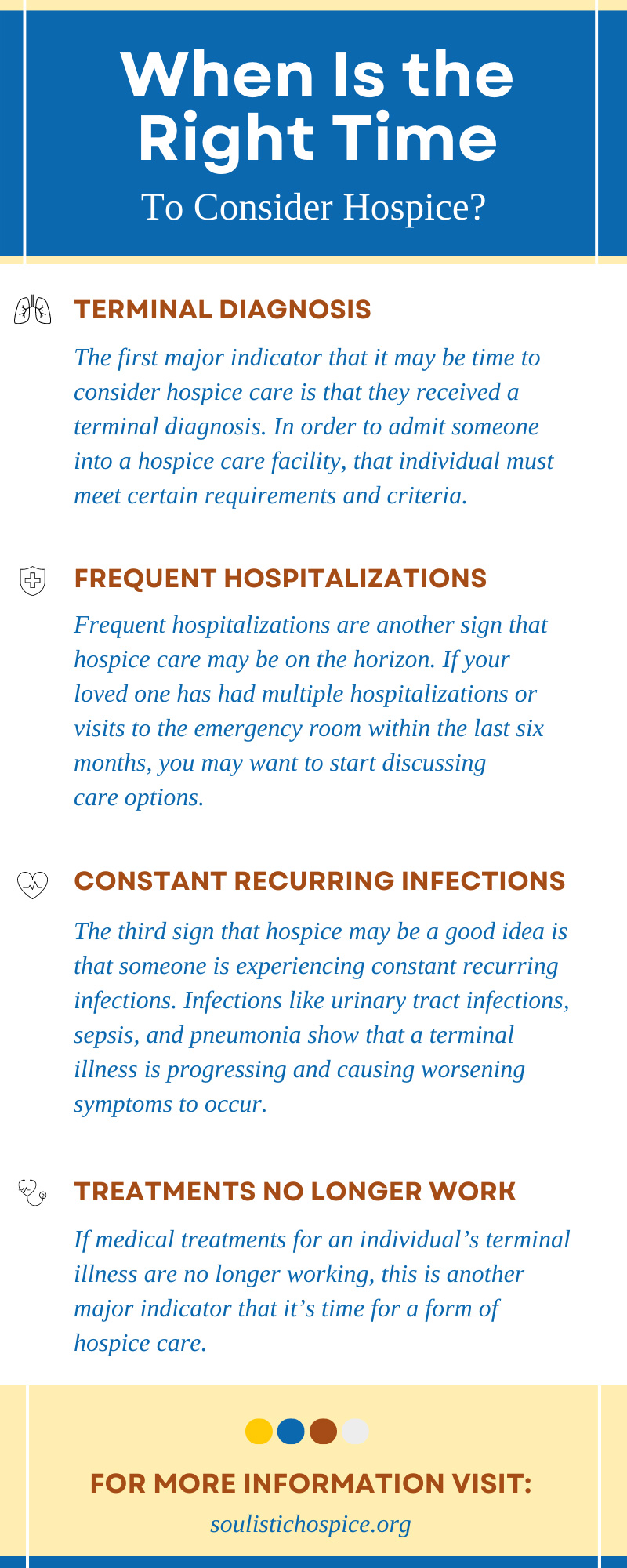
There comes a time after a terminal diagnosis when it may be appropriate to start considering alternative care options for a loved one. Hospice care is a common and effective option for people suffering from specific terminal illnesses and diseases. But when is the right time to consider hospice care?
There are many signs and symptoms that can suggest it’s a good time to start thinking about different hospice care options. Here, we will go into more detail on the specifics so that you can determine if it’s the right time for your loved one to receive hospice care.
What Is Hospice?
First and foremost, it’s essential to understand what hospice care is and how it can benefit your loved one. Hospice care is a specialized type of care that focuses on improving the quality of life for individuals dealing with a life-limiting illness or disease in its advanced stages. Instead of providing treatment for the illness itself, hospice care plans work to manage the symptoms that these individuals are experiencing. The idea of this type of care is to keep people comfortable and prepare them for end-of-life.
When To Consider Hospice
Now that you have an idea of what hospice care is, it’s important to know when it’s time to consider hospice for yourself or a loved one. While there’s not necessarily a “perfect time” for a transition into hospice care, there are some significant signs and symptoms that can indicate hospice may be an appropriate step to take. If you’re trying to help a loved one decide when to start considering hospice, pay attention to their behaviors and physical functioning and see if they’re showing these specific signs.
Terminal Diagnosis
The first major indicator that it may be time to consider hospice care is that they received a terminal diagnosis. In order to admit someone into a hospice care facility, that individual must meet certain requirements and criteria. For example, as a general rule of thumb, a person must have a terminal diagnosis and a life expectancy of six months or less. And it’s also essential that at least two physicians confirm that a patient meets this particular criterion.
Frequent Hospitalizations
Frequent hospitalizations are another sign that hospice care may be on the horizon. If your loved one has had multiple hospitalizations or visits to the emergency room within the last six months, you may want to start discussing care options. These frequent hospitalizations signal a decline in health, so it’s important to start thinking about the necessary next steps. You don’t want your loved one to have to keep making trips to the hospital and spend money on hospital bills when you could transition them into a hospice care facility with professional medical staff on hand.
Constant Recurring Infections
The third sign that hospice may be a good idea is that someone is experiencing constant recurring infections. Infections like urinary tract infections, sepsis, and pneumonia show that a terminal illness is progressing and causing worsening symptoms to occur. If your loved one has had several of these types of infections within the last six months, it’s safe to assume that their illness is getting worse, and it’s prime time to consider a hospice transition.
Treatments No Longer Work
If medical treatments for an individual’s terminal illness are no longer working, this is another major indicator that it’s time for a form of hospice care. For example, suppose your loved one has stage four esophageal cancer and treatments like chemotherapy and radiation are no longer proving effective or fighting off the disease.
In that case, it may be appropriate to stop treatments and start focusing on improving their quality of life. You want your loved one to be as comfortable as possible in their final days, and going through aggressive treatments can cause painful and uncomfortable side effects. So if these treatments don’t work anymore, considering other options, like hospice, may be beneficial.
Decrease in Mobility
A decrease in mobility is another thing that can signify it’s time to start considering hospice care options. If your loved one is struggling to walk, stand up, sit down, and get places on their own, this is an indication that their health is decreasing. If they complain of pain and discomfort when they try to move, they will require additional assistance to get around. Hospice care may help your loved one get to and from places as needed and will work to maintain their comfort levels.
Difficulty Completing Tasks
Difficulty completing daily tasks is also a sign that your loved one’s health is deteriorating. When someone is in an advanced stage of a terminal illness, completing tasks like getting dressed, brushing their teeth, showering, grooming themselves, and finishing regular chores can be challenging. One of the major benefits of a hospice care plan is that professionals work with your loved one to meet their physical and mental needs and help them to complete these tasks with provided assistance.
Weight Loss and Lack of Appetite
You may also decide it’s time to start discussing hospice options when you notice that your loved one is experiencing significant weight loss and a lack of appetite. Try to pay attention to your loved one’s diet and eating habits to determine if they’re getting enough to eat throughout the day. If they’re not eating enough or have a loss of appetite, this indicates that their body is slowing down or no longer digesting food properly.
As you try to determine if it’s the right time to consider hospice care options, pay attention to these signs and symptoms in your loved one. The sooner you are able to find appropriate care for your loved one, the better. You want them to be as comfortable as possible during the end of their life, and hospice care is a great way to ensure that they’re comfortable and taken care of. Soulistic Hospice offers high-quality hospice care in Arizona that will provide the necessary support and services for your loved one during this time.









